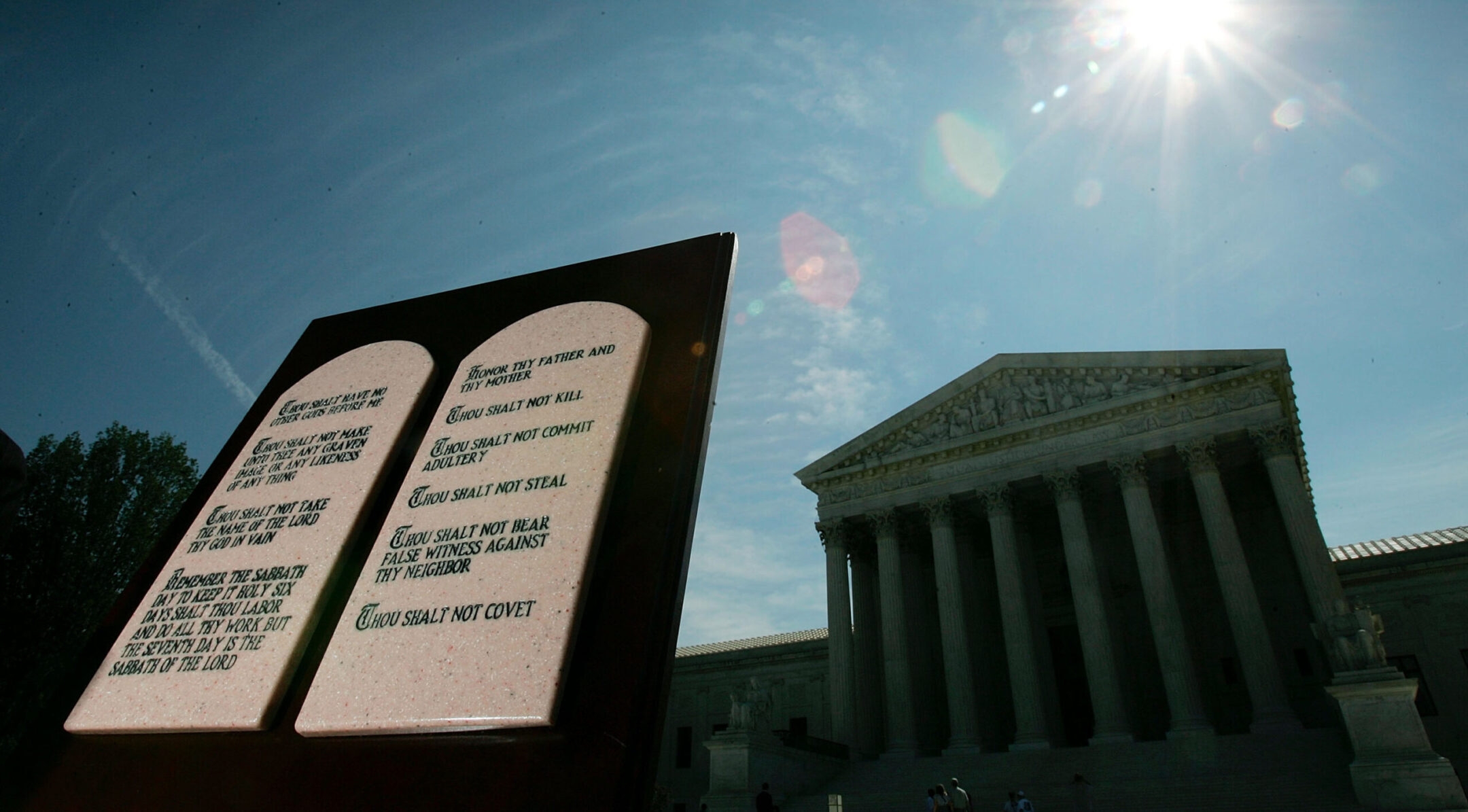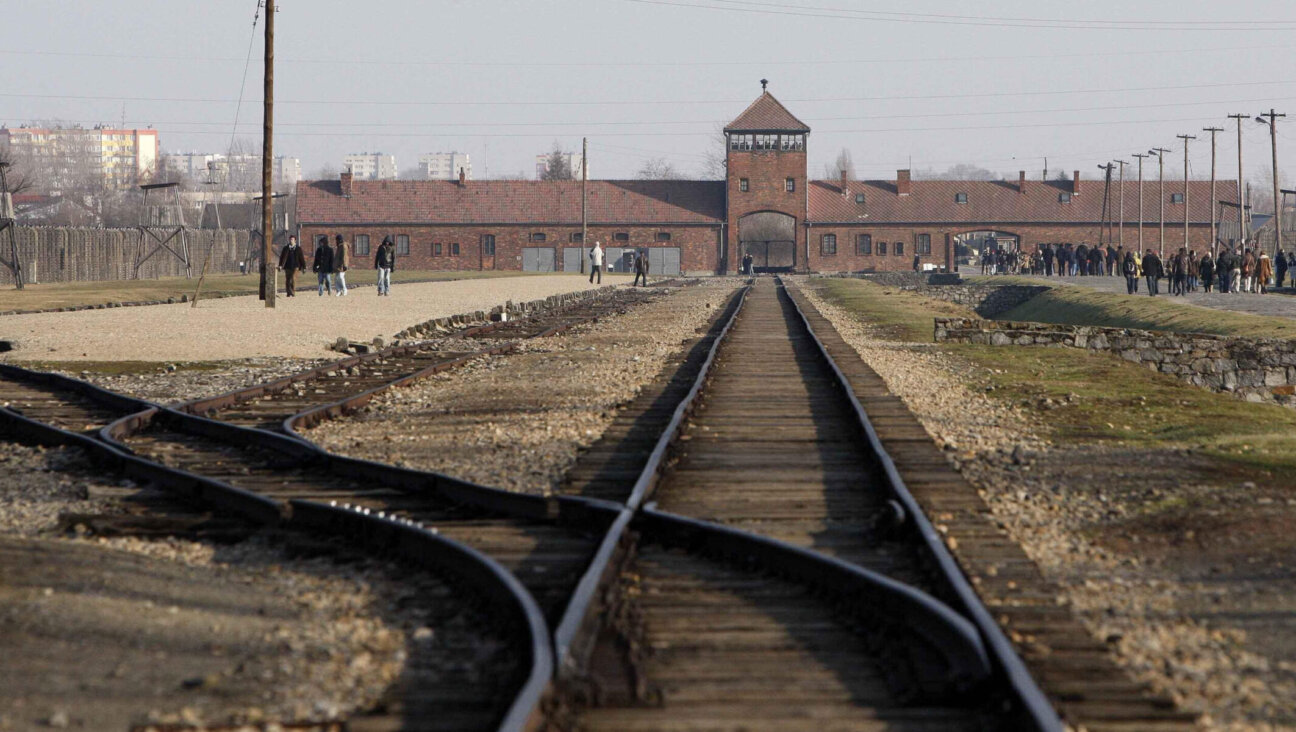After spurning Columbia, Robert Kraft gives $1M to Yeshiva U to support transfer students
In April, Kraft had announced a split with his alma mater, Columbia University, over the school’s handling of its pro-Palestinian protests

A copy of the Ten Commandments is displayed outside the U.S. Supreme Court June 23, 2005 in Washington, D.C. (Win McNamee/Getty Images)
(New York Jewish Week) — Two months after pulling his contributions from his Ivy League alma mater over its handling of pro-Palestinian protests, Robert Kraft has announced a new donation — to Yeshiva University.
On Tuesday, the billionaire philanthropist and owner of the New England Patriots announced that he is donating $1 million to the country’s flagship Modern Orthodox university to establish a program to support incoming transfer students. The university has said it is expecting an influx of students who have left their secular universities amid the protests.
Kraft had announced in April that he would be pulling his support from Columbia University, from which he graduated in 1963, and where he has donated millions: A sports field and the Jewish student center at Columbia bear his name.
In his announcement, sent by his foundation to fight antisemitism, he said he was “no longer confident that Columbia can protect its students and staff, and I am not comfortable supporting the university until corrective action is taken.”
Since the outbreak of the Israel-Hamas war on Oct. 7, Columbia has been a hotspot of pro-Palestinian protest that has rippled out to the rest of the country. Days before Kraft’s April announcement, Columbia students launched the pro-Palestinian encampment movement, which led to thousands of arrests nationwide and, critics said, hostility toward Jews on campuses across the country.
Now, Kraft is directing some of his largesse toward Y.U., which has sought to position itself as a safe haven for Jews who fear antisemitism at other schools. The same week that Kraft announced the suspension of his donations to Columbia, the Orthodox school in uptown Manhattan said it would be reopening applications for transfer students.
“No Jewish student should have to face the threats and intimidation that has sadly been taking place,” Rabbi Ari Berman, Y.U.’s president, wrote in an open letter announcing the decision. “While our enrollments are already full for the coming year, we at the flagship Jewish university will not turn our backs on these students.”
The university has previously said that it’s seen a spike in applications, but when reached by JTA on Wednesday, a Y.U. spokesperson said the university “does not provide” data regarding undergraduate and transfer applications.
Kraft is the latest Jewish philanthropist to withdraw support from non-Jewish institutions over antisemitism concerns. Venture capitalist David Magerman, who had pulled support from the University of Pennsylvania last year over its response to campus antisemitism, announced last week that he would be donating $1 million to Israel’s Jerusalem College of Technology. And last November, Jewish billionaire investor Henry Swieca quit the board of Columbia Business School, saying the campus had become unsafe for Jewish students.
Kraft’s gift to Y.U. will fund support for transfer students via a “Blue Square Scholars” program, named after the symbol at the center of Kraft’s signature “#StandUpToJewishHate” campaign. Run through his Foundation to Combat Antisemitism, the campaign’s ubiquitous blue square icon, meant to signal opposition to antisemitism, has appeared across social media and in TV ads during the Super Bowl, the Academy Awards and the NBA playoffs.
Kraft said in a statement that he established the new program “in order to give students a welcoming place to further their education and grow into leaders who will serve as advocates for unity and respect and will push back on all hate.”
He added, “At a time where hate has been unleashed across our universities, Jewish students are feeling isolated and unsafe. Yeshiva is providing a safe haven for these students and I look forward to seeing them thrive in an academic environment where they could live and study free of fear for being who they are.”
A message from our Publisher & CEO Rachel Fishman Feddersen

I hope you appreciated this article. Before you go, I’d like to ask you to please support the Forward’s award-winning, nonprofit journalism so that we can be prepared for whatever news 2025 brings.
At a time when other newsrooms are closing or cutting back, the Forward has removed its paywall and invested additional resources to report on the ground from Israel and around the U.S. on the impact of the war, rising antisemitism and polarized discourse.
Readers like you make it all possible. Support our work by becoming a Forward Member and connect with our journalism and your community.
— Rachel Fishman Feddersen, Publisher and CEO




















